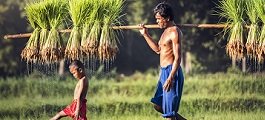When rights embrace responsibilities: biocultural rights and the conservation of the environment
Dr. Giulia Sajeva, Wednesday 9 November, 12.00-14.00. University of Strathclyde, Room GH703Download the Flyer for Dr Sajeva's seminar .
The seminar is free but with limited spaces. Please register at Eventbrite.
Giulia Sajeva is doctor in philosophy of law (Faculty of Law, Università di Palermo) with focus on human rights and the environment, trained in Political Science and International Relations, in Conservation Science at the Imperial College London and in Theory of Law and Constitutional Democracy at the Università di Genova. She researched mostly on indigenous peoples’ rights and practices concerning the conservation of the environment, ethical guidelines for research, intellectual property law and traditional knowledge, environmental ethics, and the access and benefit-sharing framework of the Convention on Biological Diversity. Dr. Sajeva collaborated with the South African NGO Natural Justice, doing field-work in Namibia, South Africa and Botswana. Currently she is collaborating with undergraduate and post-graduate courses on environmental law, legal theory and human rights at the University of Palermo and she is the Executive Secretary of the Working Group on Religion and Conservation Biology of the Society of Conservation Biology.
Abstract
The presentation will combine the debate about the protection of the environment and the movement for the promotion of indigenous peoples’ and local communities’ rights through the introduction and development of the emerging concept of biocultural rights (mostly elaborated by Kabir Sanjay Bavikatte). Biocultural rights are defined as the basket of group rights aimed at protecting the stewardship role that certain indigenous peoples and local communities have towards the environment.
The presentation will offer a picture of the concept of biocultural rights from a legal theory standpoint - foundations, duty holders, right holders, protected interests, claimants. Starting from the claim that biocultural rights’ foundations are two concurring interests - self-determination and conservation of cultural identity of indigenous peoples and local communities & the conservation of the environment - the positive and negative critiques received so far will be explored and suggestions for clarifications and innovative interpretations will be introduced.
After dismissing the noble savage myth, it will be noted how it would be incoherent to treat the protection of the environment as, solely, a consequential object of biocultural rights’ observance. I will suggest that environmental conservation is a justificatory foundation of biocultural rights. As a result, biocultural rights are understood to place upon indigenous peoples and local communities the responsibility - interpreted as a duty - to conserve the environment of their territories. Difficult questions will hence be explored concerning this central construction of holders of a duty to act as stewards, the nature of sanctions, the entitled claimants and the standards of environmental protection to judge violations.
Reflections will be provided on the problems linked with the sui generis provision of duties attached to rights, exploring the insertion of humankind or nature as a potential co-right-holders, and analysing the fact that biocultural rights seem to subordinate a set of rights of indigenous peoples and local communities to a general interest for the protection of the environment, which itself is unlikely to be immune from potentially oppressive implications.
A possible route for the harmonization of such sui generis nature of biocultural rights will then be explored investigating indigenous worldviews potentially compatible with duty-based legal systems. However it will be underlined how this strategy is not without risk. Such duties are to be weighted differently for indigenous peoples and local communities, keeping in mind their different status in international law: it may be acceptable for local communities in the lack of alternative rights and may be overwhelming for indigenous peoples vis à vis indigenous peoples’ rights which do not incorporate environment duties.
In conclusion, the biocultural rights discourse will appear as a search for new strategies to face the current environmental crisis - in which indigenous peoples and local communities are important co-agents in building alternative futures - and which needs to be understood to the fullest and treated with caution to avoid inequitable implications for their same holders.

